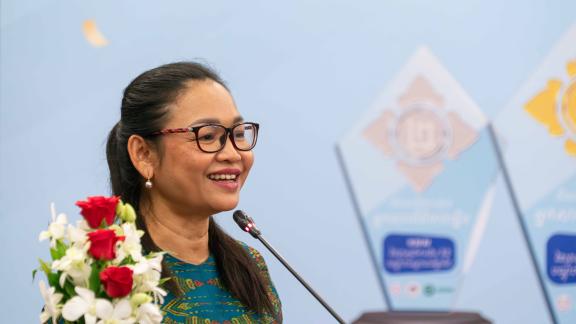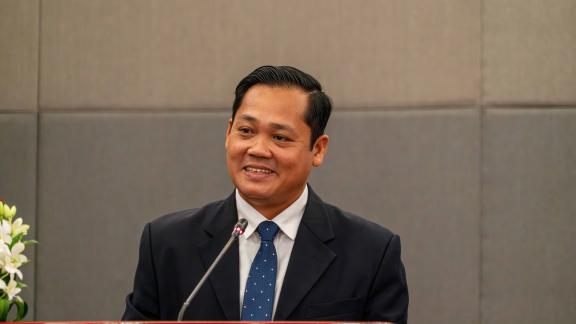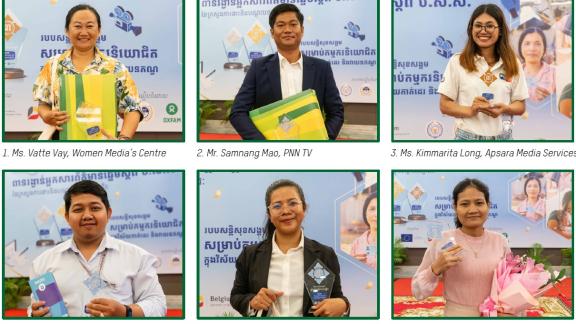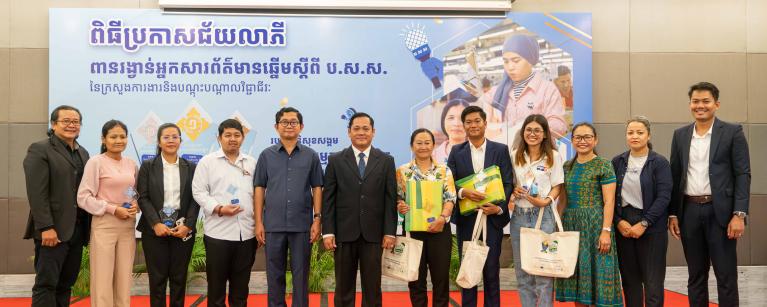Imagine a society where mothers need to get back to work a few days after delivering their newborns; children need to drop out of school and work to support their parents; persons with disabilities beg on the streets because there aren’t job opportunities for them; and elderly persons need to work to their very last breath because there isn’t a pension fund available.
That was exactly Cambodia not long ago. and many are still struggling with these hardships every day. It is why a system of support, inclusive social protections in particular, is vital to achieving gender equity and poverty reduction efforts in Cambodia.
Cambodian announced its plan on becoming an upper middle-income economy by 2030, and high-income country by 2050. This is an ambitious plan. The World Bank defines upper middle-income economies as those with a Gross National income (GNI) per capita between $4,466 and $13,845. To achieve these ambitious goals by 2030 and 2050 respectively, we need significant investment and political commitment to address poverty and improve decent jobs.
The Royal Government of Cambodia, through the General Secretariat of the National Social Protection Council (GS-NSPC) and the National Social Security Fund (NSSF), has introduced the expansion of coverage and benefits of the social security fund to cover workers in both the formal and informal economies.
This coverage expansion includes: the issuance of health equity cards to workers in the entertainment industry; maternity allowance for NSSF members who are pregnant women and their newborn under two years of age, including a voluntary contributory healthcare scheme for the dependents of NSSF members. In addition, the 7th Mandate Government has rolled out the first phase of the “Pentagonal Strategy” as its policy flagship for 2023-2028. This strategy considers strengthening social protection systems as one of the main pillars to ensure the realization of the Cambodia Vision 2050. This demonstrates Cambodia’s continued commitment to building resilience, gender responsiveness and inclusiveness in its social protection system.
“The media community is the main actor and continues to play an important role as feedback loop between governments and their constituents. Journalists and the media community help promote and raise awareness of government policies to the Cambodian public. They also serve as a feedback mechanism where the Cambodian public can raise their challenges and communicate with the government and their elected representatives, regarding the implementation of those policies. This demonstrates the continued important role of the media community and journalists in safeguarding social accountability in Cambodia.”
To support the implementation of these social protection policies and to ensure better access to information concerning decent work, health and social security benefits among workers in Cambodia’s apparel industry, Oxfam and NSSF jointly initiated the NSSF Best Reporter Awards.
This initiative aims to expand the scope of access to information and strengthen the knowledge of people and workers in the apparel industry on the social security system through social and traditional media. It also aims to enhance media coverage among journalists on social security and workers in the apparel industry. Most importantly, it is designed to strengthen cooperation between NSSF and civil society organizations with journalists and the media community.
The awards were announced to the public from 21 March 2024 to 31 May 2024. Candidates from 19 different media outlets competed for this award with their in-depth pieces on social security, knowledge and challenges of workers on access to NSSF benefits and services.
The awards ceremony was hosted on 29 June 2024 to celebrate six outstanding awardees of the “NSSF Best Reporter Awards”. The first place was awarded to a reporter from Women Media’s Centre, followed by a second place to a reporter from PNN TV, the third place to a reporter from Apsara Media Services (AMS), the fourth place to a reporter from VAYO Radio, and the fifth and sixth place to reporters from ThmeyThmey.

Speaking at the welcoming remarks, Oxfam National Director, Ms. Sophoan Phean, said, “The media community is vital in shaping the discourse on social protection, uncovering inequities, giving voice to the vulnerable, holding policymakers accountable, and empowering the public to advocate for inclusive, equitable social protection. As watchdogs, storytellers, policy analysts and catalysts for change, their work builds an informed citizenry empowered to demand the social protections needed for all to thrive, central to creating a more just and equitable world. The continued engagement of journalists and the media community in promoting social protection policy, benefits and entitlements, and addressing the challenges of using NSSF cards help improve better access to social security benefits that are inclusive and gender-responsive among Cambodia’s apparel workers.”

Deputy Director of the National Social Security Fund, H.E. Dr. Sophannarith Heng, said, “The Royal Government of Cambodia is committed to universal social security for all where members can access healthcare and injury benefits, and pension benefits throughout their lifecycle. All are critical to achieving economic wellbeing and universal health coverage for all Cambodian people. Journalists and the media community are important actors in reporting and disseminating social security policies and benefits to workers and the Cambodian public.”
The initiative is built on the longstanding partnership between Oxfam and NSSF, and media organizations. In 2023, Oxfam collaborated with NSSF, ThmeyThmey online news, and the Club of Cambodian Journalists to provide training on the social security system in Cambodia to 65 members of the national journalists from 55 different media organizations and news outlets. The training received positive feedback from participants and stakeholders. In addition, Oxfam and NSSF also received many requests from journalists and trainees to continue providing such training to members of journalists, so that they can receive policy updates and strengthen their knowledge and skills in reporting on the social security system in Cambodia.
Six outstanding awardees of the "NSSF Best Reporter Award"

